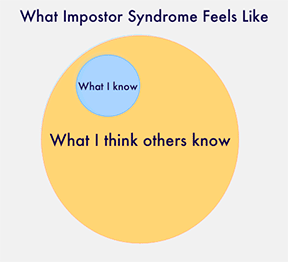 It’s very common for first time leaders to go through a stage where they feel like they fooled people into believing they’re ready for the job, but they aren’t; and it’s only a matter of time until everyone learns the truth. Surveys show up to 70% of the population experiences feelings of fraud at some point in their lives, including musician Chris Martin, actress Natalie Portman, comedian Tina Fey, executive Sheryl Sandberg, and even poet Maya Angelou. For most people, that feeling goes away after a few months on the job. For others, Imposter Syndrome is a core part of their identity and affects the way they see themselves every day. High achievers and perfectionists are particularly prone to the imposter experience. Throughout their career, despite years of success and accolades, individuals with Imposter Syndrome believe that they are a fraud.
It’s very common for first time leaders to go through a stage where they feel like they fooled people into believing they’re ready for the job, but they aren’t; and it’s only a matter of time until everyone learns the truth. Surveys show up to 70% of the population experiences feelings of fraud at some point in their lives, including musician Chris Martin, actress Natalie Portman, comedian Tina Fey, executive Sheryl Sandberg, and even poet Maya Angelou. For most people, that feeling goes away after a few months on the job. For others, Imposter Syndrome is a core part of their identity and affects the way they see themselves every day. High achievers and perfectionists are particularly prone to the imposter experience. Throughout their career, despite years of success and accolades, individuals with Imposter Syndrome believe that they are a fraud.
Believing that all your accomplishments are the result of luck or timing is unhealthy and must be addressed directly. Certainly a career coach, executive coach, or mentor would be helpful in discerning real accomplishments from luck, timing, or other people’s contributions. Additionally, individuals who are prone to imposter syndrome may benefit from aligning themselves with someone on a similar career path. But to truly address the imposter syndrome feelings, one must be open to sharing their feelings of inadequacy. Many individuals who share that they’re experiencing imposter syndrome are surprised to hear that others suffer from the same fear of failure and self-doubt.
Another option is to create a daily diary of activities and accomplishments. As we hurry through our work lives, it’s easy to forget all the strategic moves we make daily that contribute to success. All the details become blurry when we think back to a past project and try to define what worked and what didn’t.
Don’t let a fuzzy memory and self-doubt feed the imposter syndrome. Block 10 minutes on your calendar at the end of every day to log your activities. Bullet point the actions you took, the people you spoke with, and the decisions you made. Make sure you focus on the positive. While there’s certainly a benefit to reflecting on failures, that should not be the focus for people working through an imposter experience. Psychologists have found significant mental and emotional effects from daily positive journaling. Don’t hesitate to think about your diary as a Journal of Awesomeness. Celebrate all wins, no matter how small. Use the word I heavily. Ban the words they, them, and we if you find yourself slipping back into imposter mode where you downplay your role too frequently. Let your Journal of Awesomeness be the one place where you pat yourself on the back abundantly and unapologetically. Take all the credit!
Over time, this act of overt self-recognition will grow into confidence and chip away the feelings of self-doubt and fear. Being honest and open about imposter feelings, while incredibly difficult, is crucial for combating the problem. In times of doubt, reach out to your social support network so they can provide the positive feedback you need to keep the feelings of fraud at bay. Let their objective voices drown out the negative self-talk you hear every day. Nothing holds you back more than your own insecurities.
